Arrival in Warsaw
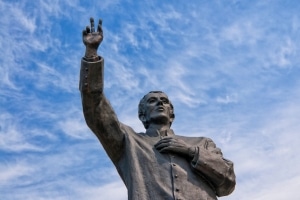
Independent arrivals at the Warsaw hotel.
1979: A Pilgrimage of Awakening – Nine Days That Changed the World
John Paul II played a pivotal role in supporting the opposition movement in Poland through his leadership as the head of the Catholic Church. A defining moment came during his 1979 visit to Poland, where in Warsaw, he addressed millions who gathered to greet him, openly defying the communist regime. “Let Your Spirit descend, and renew the face of the earth; of this land!” – these powerful and prophetic words, spoken by the Pope in Victory Square (now Piłsudski Square) in Warsaw, became a rallying cry for hope and transformation. “Poland’s great days begin today,” wrote the Primate of Poland, Stefan Wyszynski, in his journal. The combined efforts of Solidarity and Pope John Paul II marked a turning point in Poland’s political landscape.
At approximately 4:00 p.m., meet and greet your tour leader and fellow travelers in the hotel lobby. Following a brief introduction, transfer to the museum dedicated to Blessed Fr. Jerzy Popieluszko, assassinated by communist security force officers. The death of this charismatic Solidarity Chaplain serves as a testament to the struggle for human dignity. Our guided tour of Warsaw will also include the Ghetto Memorial and the Old Town, meticulously reconstructed and now a UNESCO World Heritage Site.
Afterwards, enjoy a welcome dinner at a local restaurant.
The Young in the Church
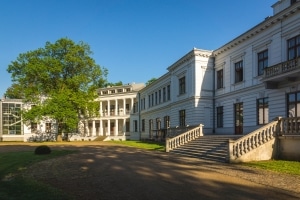
The Young in the Church
As a young parish priest, the future Pope John Paul II dedicated much of his time and energy to guiding young people. Throughout his papacy, he continued to reach out to them, urging: “Brothers and Sisters, do not be afraid to aspire to holiness!” He cautioned against the relativism of faith and treating freedom as an absolute.
Morning:
We will drive to the small village of Szymanow, home to the Monastery of the Congregation of the Sisters of the Immaculate Conception of the Blessed Virgin Mary and the Shrine of Our Lady of Jazlowiec. Marcelina Darowska, co-founder of the Congregation, was beatified by Pope John Paul II. The Sisters also operate a private boarding high school for girls.
Afternoon:
Nearby Niepokalanow is closely associated with St. Maximilian Kolbe, a martyr of Auschwitz. The recently consecrated Chapel of Peace within the Basilica has made Niepokalanow part of the Global Centre for Prayer for Peace. We will then return to Warsaw.
Evening:
Free time. Overnight stay in Warsaw.
St. Faustina’s House
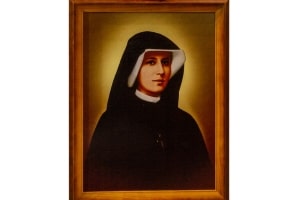
Morning:
Today, we will explore the town of Ostrowek.
In July 1924, Helena Kowalska, later known as St. Faustina, arrived in Ostrowek and worked as a housemaid at the Lipszyc family home. This was where she prepared to enter a convent in Warsaw, earning a modest income to save for her trousseau. Mrs. Aldona Lipszyc recalled that Helenka, who worked there for a year, performed her duties excellently and was treated as a family member.
Afternoon:
“Faith and Reason Are Like Two Wings on Which the Human Spirit Rises to the Contemplation of Truth…”
We will then travel to Lublin, where Karol Wojtyła served as a professor and Head of the Ethics Department at the Catholic University. All his philosophical works were published in Lublin, and he remained connected to the University until his election as Pope. In the University courtyard, a monument commemorates John Paul II and Stefan Wyszynski, the Primate of Poland, symbolically embracing during the pontificate inauguration.
Evening:
Free time. Overnight stay in Lublin.
The Path of Sacrifice
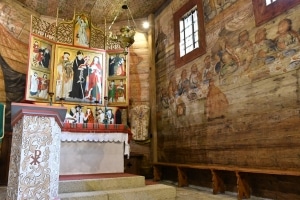
Morning:
Departure for Krakow.
“The History of Mankind Passes By Way of the Family”
For John Paul II, the family was a vital force in building a civilization of love. In the village of Markowa, you’ll find the Ulma Family Museum of Poles Who Saved Jews in World War II. Recognized as Righteous Among the Nations, the Ulmas became symbols of heroism and the sacrifice of the Polish people during the war. Their inspiring story continues to bring Catholics and Jews closer together, especially following the beatification of the nine-member family of Jozef and Wiktoria Ulma in 2023.
On our way to Krakow, we’ll stop at Lipnica Murowana to visit the charming wooden St. Leonard’s Church, a UNESCO World Heritage Site.
Evening:
Free time. Overnight stay in Krakow.
Krakow: A City of Saints and Spiritual Heritage
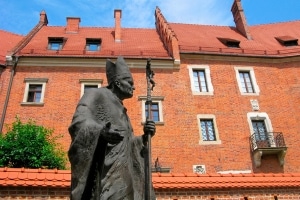
Morning:
Our day begins with a tour of Krakow, a city renowned not only for its historic architecture but also for its profound spiritual heritage. Krakow holds a unique place in Europe, with the highest number of people recognized as saints or blessed by the Catholic Church. Our guided tour includes a visit to Wawel Cathedral, where Karol Wojtyla celebrated his first Mass in memory of his brother and parents; Collegium Novum, where he lectured in theology; and the “Papal Window”, where John Paul II appeared to speak to the people of Krakow during his pilgrimages to Poland.
Next, we’ll explore the story of St. Albert Chmielowski, as written by the young Father Karol Wojtyla in his play Our God’s Brother. St. Albert left a promising career as a painter to become a champion for the poor, founding shelters for homeless children, people with disabilities, and the elderly. His motto, “Be good like nourishing bread,” guided his life’s work. We’ll visit the Sanctuary of the Albertine Sisters, home to Ecce Homo, a dramatic painting by Brother Albert depicting the suffering Christ and symbolizing the humiliated and marginalized whom he served.
Afternoon & Evening:
Free time. Overnight stay in Krakow.
Wadowice and Auschwitz through the Eyes of St. John Paul II
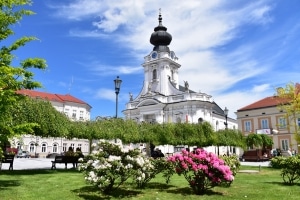
Morning:
“Eternity Waits”
We start the day with a visit to Wadowice, where St. John Paul II was born and raised. This small town played a significant role in shaping the future Pope’s spirituality and character. Every day, young Karol Wojtyla looked out at the words “Time flies, eternity waits”—a phrase that deeply resonated with him. The Wojtyla family apartment, now a museum, offers a glimpse into his formative years. John Paul II spoke of Wadowice with great affection, recalling his school days and his favorite “kremowka” (cream cake). He once shared that he ate 18 kremowki in a competition…and still lost! Poland’s Catholic Church has also initiated the beatification process for his parents, Emilia and Karol Wojtyla.
Afternoon:
We continue to Auschwitz, where John Paul II made a historic visit as the first Pope to set foot in the camp. For Wojtyla, who had Jewish friends in his youth, the tragedy of the Holocaust was a personal one. As Pope, he worked tirelessly for Christian–Jewish reconciliation, expressing deep compassion for Jewish suffering. Karol Wojtyla’s early years were shaped by the horrors of both Nazism and later communist oppression, strengthening his commitment to peace and unity. We will then return to Krakow.
Evening:
Free time. Overnight stay in Krakow.
A Pilgrimage of Divine Mercy
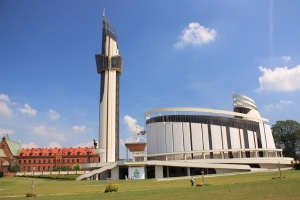
Morning:
John Paul II’s final pilgrimage in to Poland in 2002 was devoted to the message of Divine Mercy, inspired by St. Faustina. We’ll begin the day with a guided visit to Lagiewniki, known as the capital of Divine Mercy. Here, we’ll see the famous image of the Merciful Jesus, the relics of St. Faustina, and the St. John Paul II Center.
Afternoon:
Next, we’ll take a trip to Wieliczka, home to Europe’s oldest salt mine and a UNESCO World Heritage Site. The mine’s original galleries, intricately carved statues, and underground salt lakes offer a fascinating journey into history.
Evening:
Free time. Overnight stay in Krakow.
A Day in Jasna Gora and Lowicz
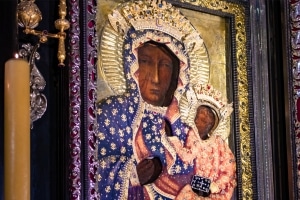
Morning:
“Totus Tuus”
We’ll begin the day with a visit to Jasna Gora, Poland’s national shrine, where Pope John Paul II entrusted his life to the Virgin Mary. Our guide will share the rich history of this sacred place, highlighting significant offerings to the Black Madonna, from bread rosaries made in concentration camps to tear-gas canisters used against Solidarity protestors—symbols of Poland’s resilience and faith.
Afternoon:
Next, we’ll travel to Lowicz to meet Kasia and Wojtek Gronecki at their unique home near the ruins of the former Primate’s Castle. Here, we’ll enjoy an intimate concert and reflect on Pope John Paul II’s belief that beauty in art can lead to a deeper understanding of faith. The Pope often emphasized this connection, believing that true art, like Chopin’s music, can transcend time and draw us closer to God.
This concept of art as a life-saving force is vividly illustrated in The Pianist, the story of Polish-Jewish musician Wladyslaw Szpilman. During World War II, Szpilman’s piano performance moved a German officer, who then helped him survive amid the ruins of Warsaw. Inspired by this story, we’ll experience the soul-stirring power of Chopin, known as the “Poet of the Piano,” whose compositions are a lasting symbol of Polish cultural identity.
We’ll conclude our time in Lowicz with a home-hosted farewell dinner, a warm and memorable way to end the day with our gracious hosts.
Evening:
Return to Warsaw. Free time to reflect on the day’s experiences.
Morning:
After breakfast, your journey comes to an end. You can take advantage of the convenient shuttle bus service from the hotel to Warsaw Chopin Airport.



 00-065 Warsaw, Królewska 11
00-065 Warsaw, Królewska 11